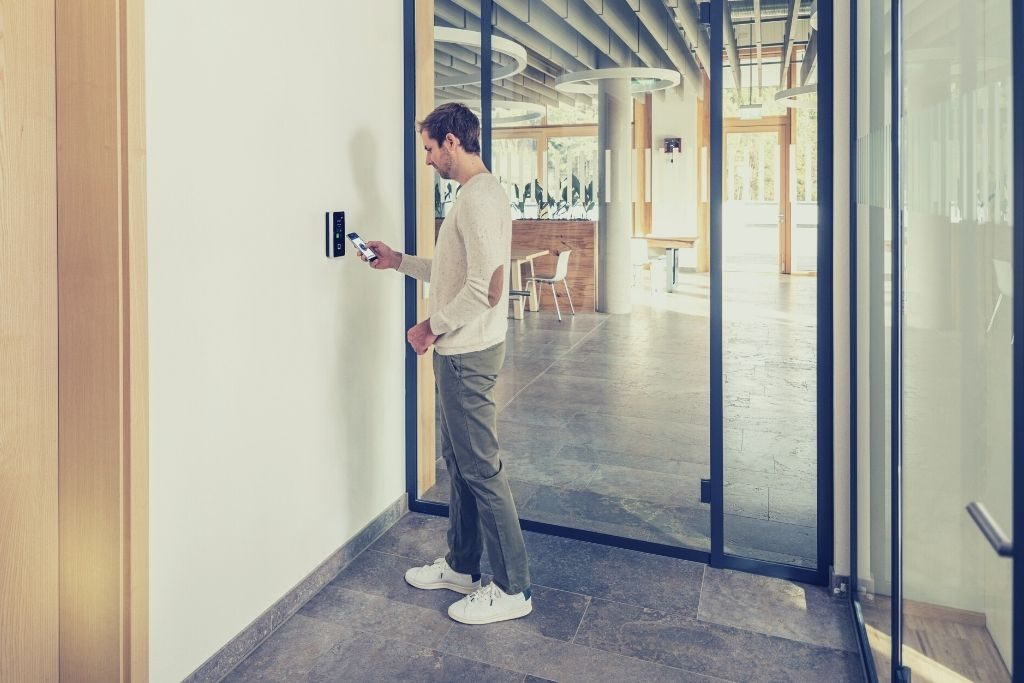Recent technological developments in cloud computing have driven innovation in the security market, convincing companies of all sizes to switch from manual or electronic access control to cloud-based ones.
Along with this prioritization of security, the access control market will grow by 10 percent annually between 2020 and 2025, reaching a USD 15 billion market size. Much of this growth is parallel to the demand for keyless entrance systems such as mobile access with smart devices, as well as cloud-based access solutions.
What is Cloud-Based Access Control?
Access control is a selective restriction process to prevent unauthorized access or operations. The most ubiquitous access control system is a mechanical lock and key, which has been in use for thousands of years. On the other hand, the rising cloud-based access control systems replace a key or a badge with digital encrypted credentials.
While methods differ, cloud-based access systems typically employ an app that can authorize entry for specific persons in customized spaces and times.
How Do On-Premise and Cloud-Based Access Control Software Differ?
The critical difference between on-premise and cloud-based access software is their deployment. On-premise access control software is installed locally on an enterprise’s computers and networks. On the other hand, cloud-based access control software is hosted on the vendor’s servers and accessed through a web browser.
Cloud-based solutions incorporate the advantages of their on-premise and electronic counterparts, such as electronic badges that can be used for other services like time-stamping or payment.
However, the latter runs independently even if there’s an interruption or failure of connection.

Top Benefits of Cloud-Based Access Control
1. Flexibility
One of the top reasons that attract companies to cloud-based access control is the unprecedented flexibility these solutions offer, in almost any area of their operations. They grant unrestricted access control to facility managers, who don’t have to worry about the digital infrastructure.
This flexibility is good for the bottom lines, too. When companies might need to invest a large lump-sum for mechanical or electronic access control, it’s possible to purchase a subscription to a cloud-based solution. This makes it a more manageable expenditure and allows companies to scale up and down depending on their access needs and budgets.

2. Saved Time and Resources
Cloud-based access control systems typically come as a holistic business service, where a contracted third party handles hosting, maintenance, and support. They’re unlimited in scale and dynamic, giving the facility managers the ability to instantly add or delete services on-demand. This makes cloud-based access control particularly attractive to companies who want to stay lean. As there is no need for any additional IT infrastructure like PCs or (backup-) servers there is also no need for operational attention by an administration.
After they decided to migrate to a cloud-based access control system, WindwerkAG, an indoor skydiving company in the medieval Swiss town of Winterthur, reduced the hassle of key management.
Physical keys meant additional work. I always had to be onsite to open the doors for suppliers. Being able to grant access and permissions remotely means I can sit back and relax.
Tobias Oertle, CEO of Windwerk
3. Integration and Adaptability
A crucial advantage of the cloud-based access control systems is their ability to integrate with other solutions in the security ecosystem. These include mobile devices, video surveillance, booking platforms, biometric credentials, and other cloud-based applications to automate workflows.
Furthermore, as these technologies evolve, it’s possible to integrate new solutions with the cloud-based access control system. Hence, cloud-based access isn’t a gimmick that will be moot with the newest technological inventions, but it’ll grow and evolve with them.
Likewise, unlike mechanical solutions or on-premise software, it’s effortless to update to the latest version permanently.
4. Remote Support Without Hidden Costs
One of the biggest challenges of mechanical or electronic access systems is the overwhelming reliance on on-premise technical help. An issue as simple as updating a calendar or a user’s permission might require onsite technical support.
However, cloud-based systems are cost-effective and efficient. Thanks to remote support, enterprises tapping into cloud-based solutions no longer have to rely on costly and unpredictable technical support. Similarly, the staff technicians don’t have to go through the time-intense training to make sense of their access system.
Cloud-based solutions come with no hidden costs, as there are typically subscribable services that can include technical support.

5. Accelerated Security
Cloud-based access control adds an extra layer of security thanks to its ability to function without connection autonomously, run regular updates and backups, as well as centralized and streamlined operations.
Facility managers are in full control, at any time, for any room and each person. The system can alert them about any open door or enable them to grant or revoke access. With automated updates and integrations that keep the systems evergreen, cloud-based access control empowers facility managers or system owners to be security experts.
Futureproof Your Access Control
For the reasons above and many more, cloud-based access control systems are a crucial business strategy for enterprises of all sizes. They cut time, costs, and hassle while enhancing security and keeping companies futureproof.







